- Home
- Warwick Deeping
Shabby Summer
Shabby Summer Read online
* A Distributed Proofreaders Canada eBook *
This eBook is made available at no cost and with very few restrictions. These restrictions apply only if (1) you make a change in the eBook (other than alteration for different display devices), or (2) you are making commercial use of the eBook. If either of these conditions applies, please contact a https://www.fadedpage.com administrator before proceeding. Thousands more FREE eBooks are available at https://www.fadedpage.com.
This work is in the Canadian public domain, but may be under copyright in some countries. If you live outside Canada, check your country's copyright laws. IF THE BOOK IS UNDER COPYRIGHT IN YOUR COUNTRY, DO NOT DOWNLOAD OR REDISTRIBUTE THIS FILE.
Title: Shabby Summer
Date of first publication: 1939
Author: Warwick Deeping (1877-1950)
Date first posted: May 28, 2019
Date last updated: May 28, 2019
Faded Page eBook #20190553
This eBook was produced by: Mardi Desjardins, Al Haines, Jen Haines & the online Distributed Proofreaders Canada team at https://www.pgdpcanada.net
BOOKS BY THE SAME AUTHOR
FANTASIA
THE MALICE OF MEN
THE WOMAN AT THE DOOR
BLIND MAN’S YEAR
NO HERO—THIS
SACKCLOTH INTO SILK
TWO IN A TRAIN
THE MAN ON THE WHITE HORSE
SEVEN MEN CAME BACK
TWO BLACK SHEEP
SMITH
OLD WINE AND NEW
THE ROAD
SHORT STORIES
EXILES
ROPER’S ROW
OLD PYBUS
KITTY
DOOMSDAY
SORRELL AND SON
SUVLA JOHN
THREE ROOMS
THE SECRET SANCTUARY
ORCHARDS
LANTERN LANE
SECOND YOUTH
COUNTESS GLIKA
UNREST
THE PRIDE OF EVE
THE KING BEHIND THE KING
THE HOUSE OF SPIES
SINCERITY
FOX FARM
BESS OF THE WOODS
THE RED SAINT
THE SLANDERERS
THE RETURN OF THE PETTICOAT
A WOMAN’S WAR
VALOUR
BERTRAND OF BRITTANY
UTHER AND IGRAINE
THE HOUSE OF ADVENTURE
THE PROPHETIC MARRIAGE
APPLES OF GOLD
THE LAME ENGLISHMAN
MARRIAGE BY CONQUEST
JOAN OF THE TOWER
MARTIN VALLIANT
THE RUST OF ROME
THE WHITE GATE
THE SEVEN STREAMS
MAD BARBARA
LOVE AMONG THE RUINS
Warwick Deeping
________________________________________
SHABBY SUMMER
McCLELLAND & STEWART LIMITED
PUBLISHERS TORONTO
Copyright, Canada, 1939
BY
McCLELLAND & STEWART, LIMITED
PRINTED IN CANADA
T. H. BEST PRINTING CO., LIMITED
TORONTO, ONT.
SHABBY SUMMER
I
Dr. Bacchus of Loddon, driving his car from Badger’s Farm, saw Peter Ghent’s nursery lying below in the March sunshine. What an amazing spring was this, with the almond flowering in February, and the peach trees showing cerise buds! Dr. Bacchus stopped his car on the hill, and getting out, looked down upon those acres of young trees, hundreds upon hundreds of them like vines arow in a vineyard. Yes, young Ghent had brought Marplot up to concert pitch, and yet, as Dr. Bacchus knew, Marplot had an unhappy reputation in the valley. It had broken two men, but young Ghent seemed to have made good in his struggle with nature. Short of money he might be after seven years of construction and of planting, but Marplot was in great heart, and the sun was shining.
Yes, that March sun was marvellous and splendid, but Dr. Bacchus was a countryman, and he knew that when nature throws you a bag of gold she may be keeping some malicious mortgage up her sleeve. Young Ghent owed him a bill for attending his housekeeper during the winter. No, he was not going to press the lad. Dr. Bacchus was a magnanimous soul, who understood that the land must pay when it pleased.
He drove his car on down Badger’s Lane, and at the white gate opening into the Marplot yard he saw young Ghent himself helping to load some baskets of trees on to a hired lorry. Dr. Bacchus pulled up, and Peter Ghent came across to him, a tall, dark lad in shorts and a green pullover.
“How’s Mrs. Maintenance keeping, Peter?”
Ghent smiled at him.
“Quite fit again, Doctor. By the way, I’ll——”
Bacchus knew what Ghent wanted to say, and he was first in the field.
“That’s all right, Peter. I’m in no hurry, like the land. You look in pretty good shape here.”
“Yes, I have a feeling, Doctor, that I’m just on the top of things, at last.”
“Splendid. Well, don’t you worry.”
Dr. Bacchus drove on to the main road where the March sunshine was bringing the hedgerows into premature greenness. What a month! And what would follow after? And was Peter Ghent asking himself that question?
* * *
The Weir Bridge was Georgian. Its two red brick arches carried the Farley-Loddon road across the river, and standing there and leaning your arms upon the old stone coping you could listen to the thunder of the weir, and watch the water in a glassy curve break below into fretted foam. Always, it seemed cool on the Weir Bridge, even on a sultry August day, with the willows ashimmer, and the river swelling down Folly Reach, and making Folly Island appear like a green bubble floating in water that could be brown and green and grey. There were willows on the island, sometimes somnolent, sometimes whipped by the wind, and trailing green fingers in the water. Willow-herb and loosestrife purpled the banks in summer.
A loiterer on the bridge, looking northwards up the river valley, could command the whole of that English scene, though, unless he was country minded and sensitive to atmosphere, the human implications might have eluded him. Beautiful the valley was, with the sweeping silver of the river and its great green slopes of wood, parkland and meadow. Folly Island floated in the foreground, with Folly Farm glibly modernized on its western bank, and wearing a kind of succulent grin on its Edwardian Tudor face. On the right, a white notice-board topping a laurel hedge bore the inscription “Peter Ghent, Tree Specialist,” and beyond it the two old red chimneys and tiled roof of Peter’s cottage rose from a smother of fruit trees and flowering shrubs and ancient yews. Marplot was its name, and it carried the scent of an old English and puckish humour. Behind the cottage lay the Ghent nursery, row upon row of baby trees, beautiful in their order and their health, conifers of all sorts, pyrus, cherries, lilacs, philadelphus, azaleas, rhododendrons, young forest trees, and rare things known to the few. Westwards, in the middle distance, and planted on a little plateau, Farley village pricked its red ears behind a screen of elms. There were rooks here and busy bird noise, and a grey church spire, sometimes dim, sometimes brilliant in the sunlight. Meadows and woods rose to the park of Temple Manor, and against the northern sky the great white house of the Vandeleurs stood mysterious amid its beechwoods. Over against it and beyond the river on the east, the bastard French tourelles of Temple Towers smirked above the trees. A vulgar mansion this, blatant and bold-eyed, and glaring down the valley like some captain of industry claiming the old world to be newly his. Veni, vidi, vici, though old Crabtree had no Latin, and a vocabulary that was crude and forceful.
Let the loiterer on the Weir Bridge face about, and he would be confronted with yet another notice-board inviting the world to hail whoopee a
nd modern joys—“The Blue Lagoon,” where the new world could bathe and bask and play tennis, and drink Mrs. Corah Prance’s little drinks. It might be a source of wonder to Farley village why a large, rectangular bath should be needed when the river was available, but then Mrs. Prance’s pool was supposed to be heated, and welcomed you when the river might make you shiver. The Roman touch! And almost reviving the spirit of history, far away, on the south-west slept the site of Roman Ebchester, where antiquarians had uncovered the dry bones of the Roman thermæ.
* * *
Two young wenches, one red of head, the other blonde, flashing over the Weir Bridge in a large, silver-blue American saloon, and turning at speed into Badger’s Lane, were confronted by the snub nose of an ancient Morris Cowley. One young thing was saying to the other young thing, who had a cigarette stuck in a vacant face—“Oh, my dear, too much hair on a man’s legs is sick-making. Light me a fag.” Then brakes squealed. The Morris, crawling at five miles an hour, stopped dead, but the high-sprung American car, swinging over the crown of the road, and lifting its nose under the drag of the brakes, rammed its front buffer into the lamps and radiator of the Morris. The cigarette fell from the blonde young woman’s face. Both cars stood interlocked rather like two beetles battling nose to nose. For a moment there was silence.
The young man got out of the Morris. He looked at the crushed nose of the good old veteran and at the smashed lamps, and then, addressing the girl with the red hair, he spoke just one word.
“Idiot.”
The reaction was instant. Miss Redhead flared. She was in the act of putting her car into reverse gear to detach it from its victim.
“Why didn’t you sound your ruddy horn?”
The young man had dignity. He looked her full in the face.
“Because I was stopping before taking the corner. Perhaps you will observe that you are well over the crown of the road. And you were doing twenty, and talking. No one but an idiot——”
She backed her car away, but he followed her, remaining close to her off-side window, and she tossed her hair at him.
“Cut it out. I don’t want any cheek from you. You know who I am.”
“Perfectly.”
“Well, bung your claim in to the insurance people, and push your old bag of bones home.”
He may have flushed faintly under the gibe, for his old car had served him well. Almost, it was like a good old dog. His eyes held hers and outstared them. She looked him over, saw his brown shorts and bare legs, and suddenly she began to giggle. She did not get out to examine her own car, but, putting it in first gear, revved up her engine, let in the clutch, and swung it out and clear of the Morris. There was a suggestion of scornful and ironic snortings in the way it rounded the next corner and disappeared up the green tunnel of the lane.
Miss Goldilocks, more thin of skin, had been badly scared. Moreover, the fallen cigarette had burned a hole in her new pleated skirt.
“Dash it, Rene, it was your fault, you know. Look at this hole.”
Miss Irene Crabtree let out a little squirl of laughter.
“Gosh, did you see his legs?”
“Legs?”
“All hairy. Cheeky cad! About time someone knocked the bottom out of his old tin pan. After all, what are we insured for?”
“But you did take that corner——”
“Of course. No use for the safety first brigade.”
“I thought he took it rather well.”
“Oh, did you?”
“Who is he?”
“The blighter who runs the nursery there. Name of Ghent. Light me a fag, Syb. Gosh, won’t the old man chuckle.”
Her friend’s face had become peevish.
“I wish you wouldn’t call me Syb. Hadn’t you better stop and have a look at the car?”
“She’s O.K. I’ve bumped things before. Besides, we’ll be home in two ticks.”
* * *
Ghent was contemplating the crumpled face of the Morris. The damage was obvious. A puddle of water was collecting on the roadway from the damaged radiator, and trickling towards the grass verge. Possibly he was a sentimentalist, but it seemed to him that the old car was weeping over the insult offered to it by brazen youth. Yes, in a way he understood such insults. Life could be full of strange discords when you were not commercially minded, and loved your job more than you loved money, and had neighbours like the Crabtrees. His blue eyes seemed to contain for a moment secret flares of anger, though a sensitive fastidiousness had taught him that anger was wasted on certain people. Life was too precious, and your stomach and your proud soul suffered.
Well, he would have to bike into Loddon. Poor old Oliver Cromwell would need his face lifting and a new pair of spectacles; and with the slow, deliberate stride of the countryman Ghent walked up the lane towards his cottage, opened the gate and shouted.
“George.”
The hail came back to him over a hedge.
“Hallo, sir.”
“Get Bob, will you? We’ve got to push the car in.”
George’s face and cap appeared over the hedge. He was a long, thin lad with very white teeth, a high colour, and a pleasantly cheeky smile.
“Had a smash, sir?”
“Miss Crabtree ran into me. Came round the corner at twenty without hooting or looking.”
“Thought I heard something. That young woman ought to be took off the road. Killed the baker’s dog last week. I’ll get Bob.”
Robert Fanshaw was a man of fifty, lean, round-shouldered, laconic. He had been hoeing weeds, and he came slouching out of the white gate, sleeves rolled up, his grizzled hair fitting him like a skull-cap. Unlike most countrymen he chose to work bare-headed.
“Miss Crabtree, her mark, Bob.”
With Ghent at the steering-wheel, the three of them man-handled the old car up the lane and into the yard beside the cottage. Oliver Cromwell lived in the little coach-house of the red brick stable that had housed the ponies and traps of the Victorians. A bicycle was leaning against the coach-house wall, and Ghent wheeled it out and mounted.
“You might be about, Bob, in case anyone looks in. I shall be back for tea.”
“Very good, sir.”
Peter rode out into the lane leaving the two men together.
Said George to Bob: “What that young bitch wants is a damned good smacking.”
The older man rubbed the back of a hand across his chin.
“Ah, that might be easy. But what would you do with her ruddy old father? That’s where the rub comes, my lad.”
* * *
Ten yards or so beyond the junction of Badger’s Lane and the main road two wrought-iron gates, hung upon brick pillars capped with stone balls, broke the green wall of the laurel hedge. Within lay Peter Ghent’s “Show-Piece,” a grass path twelve feet wide kept closely mown, and on either side two broad borders thickly planted with young trees and shrubs. Even your untarnished enthusiast must be allowed his Shop Window, and Peter’s window, seen through the iron grille, was, even in winter, a thing of beauty. Much love and labour were spent upon this little vista, for, to keep it in flower through the year’s flowering season, Peter marshalled a little regiment of blossoming things in pots which were sunk in the soil, to bloom in succession. It was like a gorgeous missal in some monkish scriptorium, upon whose pages devoted hands impressed quaintness and colour. At the moment it was a mass of Azalea Mollis, and hybrid rhododendrons, with here and there a young standard wistaria pendant with mauve racemes. A yew hedge gave a dark backing to each border, and set in front of the hedge were rare and exquisite young conifers, Conica with its glaucous spires, Fletcherii, Allumii, the Blue Virginian Juniper, Cupressus Aurea, Irish and Japanese junipers, Thuyas. Even in winter the varied colours of these conifers made the place beautiful and strange. The vista was closed by a length of treillage upon which was blooming an old Clematis Montana Rubra, a cloud of rose-white stars.
Down one brick pillar hung a short length of chain, and on one leaf of the g
ate hung a notice.
“Visitors—please ring.”
Peter had had to shorten this chain, for mischievous children had amused themselves by ringing the bell which hung under a little pent-roof at the back of the pillar.
Said the lady in the dog-cart: “You had better ring the bell, Simmons.”
Simmons rang it. His cockaded top-hat belonged to a previous generation. So did the mistress, Lady Vandeleur of Temple Manor. The dog-cart with its black and yellow wheels had come bowling through Farley village, my Lady Melissa holding the reins, but this archaic vehicle was as familiar to the villagers as was the lady, and in its way as well beloved. Mr. Roger Crabtree employed a Rolls Royce, and though Temple Manor did possess a car, Melissa Vandeleur somehow clung to the England of her youth.
The groom came to crook an arm for her, and to protect her skirt from the mudguard, an antique gesture. Melissa Vandeleur might be sixty-five, but she was slim, and light in her movements. Her white hair and lashes shaded a pair of jocund eyes; the lovely mischief of maturity had mellowed in her, but her gentle tongue could sting. Was it not she who, at some function, had cowed that impossible old brute, Roger Crabtree?
My Lady stood by the gate, looking through it at all that loveliness and loving it for what it was, without being vexed by the petty passion to possess. She too had azaleas, but she was obliged to grow them in a little dell of their own where the chalk ceased and the river had left its drift, with their faces in the sun and their roots in the moist loam.
Bob appeared through the arch in the treillage, a shambling, knock-kneed, gaunt figure, but somehow very much a person. He was notoriously without social grace, but in Lady Vandeleur’s presence he touched a forehead with a work-worn first finger, and smiled. He was a different man when he smiled.
“Good day, m’lady.”
“Good day, Bob. Mr. Ghent in?”
“He’s gone to Loddon, m’lady, but he’ll be back in half an hour.”
He unlocked the gate, opened it and let her in.

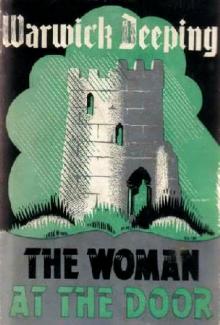 The Woman at The Door
The Woman at The Door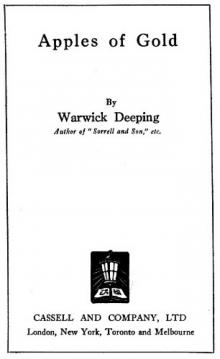 Apples of Gold
Apples of Gold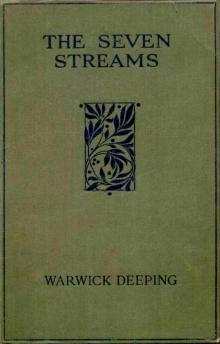 The Seven Streams
The Seven Streams Old Wine and New
Old Wine and New No Hero-This
No Hero-This Two in a Train
Two in a Train Valour
Valour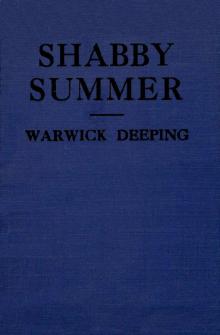 Shabby Summer
Shabby Summer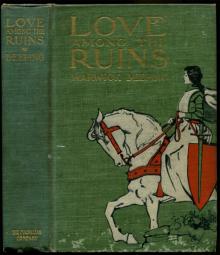 Love Among the Ruins
Love Among the Ruins The Short Stories of Warwick Deeping
The Short Stories of Warwick Deeping